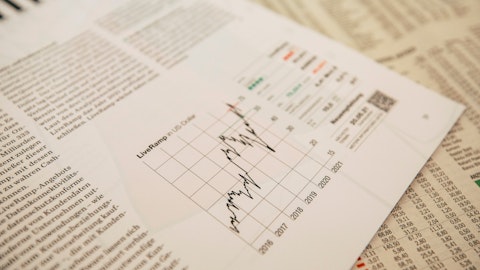In this article, we discuss the 10 stocks most vulnerable to recession. If you want to skip our discussion on the global economic situation, go directly to 5 Stocks Most Vulnerable to Recession.
It has been a difficult year for investors as the stock market entered bear territory twice by experiencing a decline of 20%. The market bounced back quickly after the first downturn, but the second drop lasted for a longer period. Investors and analysts are coming to terms with high and persistent inflation and Federal Reserve’s aggressive policies to combat it. During Q2 2022, the S&P 500 Index lost 16.4% of its value; since the start of 2022, the Index has been down 20.6%. The decline has only enhanced the investors’ expectations of a possible recession.
Experts anticipate stocks to bounce back, but the market conditions show that recovery is not on the horizon anytime soon. Investment advisors anticipate a recession and think that the stock valuations are still high despite a major correction. Chief investment officer at Cambria Investment Management, Meb Faber, expects a correction of as much as one-third from the current levels for the market to reach historical average valuation levels.
“I think we’re in for a lot more pain, probably, in US stocks,” said Faber.
On the upside, some analysts believe that the economy could experience a further slowdown in growth but would avoid major and lengthy contraction. This takes the conversation in a new direction as the market is trying to predict the severity of a possible recession, with some anticipating a brief and a non-significant one.
Goldman Sachs’ Forecasts
Goldman Sachs is crunching the numbers for US stock returns in case of a recession, ahead of the Q2 results for many companies. For 2022, the New York-based investment firm anticipates an 8% rise in S&P 500 average EPS to $226 as opposed to a market consensus of a 10% increase. David Kostin, the chief U.S. equity strategist at Goldman Sachs, anticipates S&P 500 average EPS to decline by 11% during the second half of 2022 to $200 in case of a mild recession. The contraction in earnings would also cause a contraction of the P/E multiple to 14x. This would take down the S&P 500 Index further by 20% from the current level to 3,150 points by the end of 2022. The diversified financial firm places the probability of a recession at 30% in the next 12 months and at 48% in the next 24 months. The team also expects the raging inflation to subside due to weak demand. Goldman Sachs considers notable companies such as NVIDIA Corporation (NASDAQ:NVDA), The Walt Disney Company (NYSE:DIS), and McDonald’s Corporation (NYSE:MCD) as vulnerable to recession, keeping in view their historical performances in downturns.
A recession adversely impacts the demand of an economy, and this causes the earnings of corporate entities to contract. However, the current earnings expectations of companies set by analysts are still high and do not incorporate the possibility of a recession. As a result, analysts are now downgrading stocks and lowering the price targets across all sectors. It must be noted that the possibility of a recession is not only looming over the US but across Europe as well. However, the dynamics in Europe are complicated due to the Eurozone and the conflict between Russia and Ukraine.

Photo by Adam Nowakowski on Unsplash
Our Methodology
Let’s begin our list of 10 stocks most vulnerable to recession. We will look at the current business fundamentals of these companies and discuss how the recession will impact their operations. In addition to the hedge fund sentiment, we have discussed the analyst ratings and the historical performance of companies to assess the difference between their margin growth in recessions and the consensus 2023 forecasts.
10 Stocks Most Vulnerable to Recession
10. United Airlines Holdings, Inc. (NASDAQ:UAL)
Number of Hedge Fund Holders: 31
United Airlines Holdings, Inc. (NASDAQ:UAL) is a Chicago, Illinois-based corporation that owns United Airlines as a subsidiary.
United Airlines operates flights on a large network of local and international routes. The airline industry has been under immense pressure, with flights getting canceled due to labor shortages. Before the recent decline, jet fuel prices were also flying high, in line with crude oil prices. Furthermore, the recovery in travel post-pandemic has been inconsistent, and concerns related to a recession are further expected to dent travel demand.
In a note issued to investors on July 12, Christopher Stathoulopoulos at Susquehanna slashed the price target on United Airlines Holdings, Inc. (NASDAQ:UAL) from $60 to $43. The revised target price reflects a potential upside of only 8.8% from the closing price as of July 15. The analyst sees the need for a “clearing event” to provide clarity to investors regarding the company’s growth prospects. Stathoulopoulos is particularly signaling toward a downward revision of United Airlines Holdings, Inc.’s (NASDAQ:UAL) 2022 and 2023 guidance for capacity and an upward revision to the costs outlook.
In Q1 2022, 31 hedge funds held a stake in United Airlines Holdings, Inc. (NASDAQ:UAL), down from 35 in the previous quarter.
9. Hasbro, Inc. (NASDAQ:HAS)
Number of Hedge Fund Holders: 38
Hasbro, Inc. (NASDAQ:HAS) is a Pawtucket, Rhode Island-based play and entertainment company that has a portfolio of nearly 1,500 brands comprising board games, media assets, and toys.
On July 15, Stephanie Wissink at Jefferies slashed the price target on Hasbro, Inc. (NASDAQ:HAS) from $115 to $100. Hasbro, Inc. (NASDAQ:HAS) is gearing up to report its Q2 2022 earnings on July 19. The analyst reduced Hasbro, Inc.’s (NASDAQ:HAS) earnings forecast and the target price to reflect the underlying slowdown in demand as consumers are slashing down on discretionary expenditure due to rising inflation.
According to Goldman Sachs, Hasbro, Inc. (NASDAQ:HAS) is amongst its list of stocks having a significant gap between its historical margin growth in recessions and the consensus estimates for 2023. Hasbro, Inc.’s (NASDAQ:HAS) 12-month forward P/E multiple stands at a 9% premium to its 20-year median.
Hasbro, Inc. (NASDAQ:HAS) was held by 38 hedge funds as of Q1 2022, with Alta Fox Capital Management as the leading hedge fund holder.
8. Baker Hughes Company (NASDAQ:BKR)
Number of Hedge Fund Holders: 39
Baker Hughes Company (NASDAQ:BKR) is a Texas-based oilfield equipment and services company.
Baker Hughes Company (NASDAQ:BKR) was acquired by the Oil and Gas division of General Electric Company (NYSE:GE) in July 2017. Under the terms of the merger, the diversified industrial conglomerate took a 62.5% stake in Baker Hughes Company (NASDAQ:BKR). The former shareholders of Baker Hughes received 37.5% ownership of the company along with a special cash dividend of $7.4 billion. However, in July 2020, General Electric Company (NYSE:GE) divested its stake.
In an investor note issued on July 13, Connor Lynagh at Morgan Stanley reduced the price target on Baker Hughes Company (NASDAQ:BKR) from $40 to $35 but maintained an Overweight rating on the stock. The analyst thinks that the valuations in the oilfield equipment and services industry have “moved from discounting a multi-year bull market toward discounting at least some risk of a global recession.” Lynagh sees the company’s Q2 2022 results to be in line with consensus estimates but thinks that Q3 2022 estimates are on the higher side and could require revisions from the analysts.
As per Goldman Sachs, there is a gap of over 2400 bps between the 2023 consensus estimates for Baker Hughes Company (NASDAQ:BKR) and its margin growth in the last three recessions, making the stock vulnerable to an economic downturn.
Here’s what Sound Shore Management said about Baker Hughes Company (NASDAQ:BKR) in its Q1 2022 investor letter:
“Energy was the best performing sector which was reflected in our top contributors. Energy technology provider Baker Hughes finished higher, driven by stronger than expected order growth in its liquid natural gas (LNG) turbo-machinery segment and increasing global rig count. Both companies have strong balance sheets with little debt and are returning capital via dividends and stock repurchases. Soaring energy prices and Europe’s unfortunate reliance on Russian supply reinforced our belief that low cost natural gas is both a strategic and economic advantage for the United States. Over the last several years, the pandemic, supply disruptions and lack of investment, along with extreme weather conditions had already driven prices higher. Still, natural gas is expected to play a critical role in the transition to renewable energy sources and these two investments benefit from the increased demand.
Baker is the dominant player in LNG projects and its growing backlog is a positive indicator of how this business may drive future earnings. They are also a leader in carbon capture technology and the development of hydrogen as a clean, alternative fuel source. Carbon capture technology is considered critical to delivering CO2 reductions needed to meet global climate and net-zero emissions targets. Applicable to both the energy and industrial sectors, carbon capture is among the most promising de-carbonization solutions for both existing facilities and new greenfield projects. We were able to purchase the stock at a below normal valuation and an attractive 8% free cash flow yield and we remain positive on its future prospects.”
7. DuPont de Nemours, Inc. (NYSE:DD)
Number of Hedge Fund Holders: 50
DuPont de Nemours, Inc. (NYSE:DD) is a Wilmington, Delaware-based diversified chemical company.
On July 13, Steve Byrne at Bank of America lowered the price target on DuPont de Nemours, Inc. (NYSE:DD) from $77 to $73. The analyst slashed his estimates for the specialty chemical industry as he anticipates slower economic growth, a foreign currency headwind, and a contraction in multiple due to rising interest rates.
DuPont de Nemours, Inc. (NYSE:DD) stock can face a significant downturn in fortunes due to a recession. In 2023, analysts anticipate the company’s net profit margin to jump by 1.12%. Meanwhile, in the last three recessions of 2001, 2008, and 2020, DuPont de Nemours, Inc. (NYSE:DD) has experienced a median YoY drop of 10.37% in net profit margins. This difference of 11.49 percentage points (ppts) reflects the level at which the analysts have to incorporate the possibility of a recession in the bottom line of DuPont de Nemours, Inc. (NYSE:DD).
Of the 912 hedge funds in Insider Monkey’s database, 50 funds held a stake in DuPont de Nemours, Inc. (NYSE:DD) as of Q1 2022.
6. General Electric Company (NYSE:GE)
Number of Hedge Fund Holders: 51
General Electric Company (NYSE:GE) is a Massachusetts-based industrial conglomerate with a presence in the aviation, healthcare, power, and renewable energy segments.
General Electric Company (NYSE:GE) stock has received four downward revisions in the target price since the start of July 2022. On July 12, Joseph O’ Dea at Wells Fargo lowered the price target on General Electric Company (NYSE:GE) from $74 to $72 and maintained an Equal Weight rating on the stock. The analyst suggests avoiding risk by not taking a position in the diversified multi-industry sector. The sector faces headwinds in the form of tougher order comps, adverse currency movements, and downward revisions in guidance.
Vulcan Value Partners shared its insights on General Electric Company (NYSE:GE) in its Q3 2021 investor letter. Here’s what the firm said:
“During the quarter, we sold our positions in General Electric Co. General Electric is a company we followed for a long time. In the past, we removed GE from the MVP list due to management’s poor capital allocation decisions which resulted in value instability. Larry Culp, the former CEO of Danaher, became CEO of General Electric in 2018. The company implemented a vast restructuring program to simplify the industrial side of its business, sold off non-core assets, paid down debt with the proceeds, and drastically shrunk GE Capital. These restructuring activities allowed its world-class jet engine and healthcare businesses to shine through, and improved value stability. As a result, we added the company back to the MVP list. While the pandemic negatively impacted General Electric’s aviation business in the short run, it also gave us the opportunity to buy General Electric in the second quarter of 2020 with a substantial margin of safety. GE is a good example of a competitively entrenched, yet slower growing MVP business. As its stock price rose rapidly over the last year, its value growth did not keep up, and the price to value gap closed quickly. As our margin of safety diminished, we sold our position in GE and allocated to more discounted companies.”
ARK Investment Management lowered its investment in General Electric Company (NYSE:GE) by 10% during Q1 2022.
Besides General Electric Company (NYSE:GE), NVIDIA Corporation (NASDAQ:NVDA), The Walt Disney Company (NYSE:DIS), and McDonald’s Corporation (NYSE:MCD) are also expected to face a strong adverse impact in case of a recession.
Click to continue reading and see 5 Stocks Most Vulnerable to Recession.
Suggested Articles:
- Top 10 Stock Picks of Cannell Capital
- 10 Best Natural Gas Stocks to Buy Now
- 10 Commodity Stocks to Buy On The Dip
Disclose. None. 10 Stocks Most Vulnerable to Recession is originally published on Insider Monkey.





